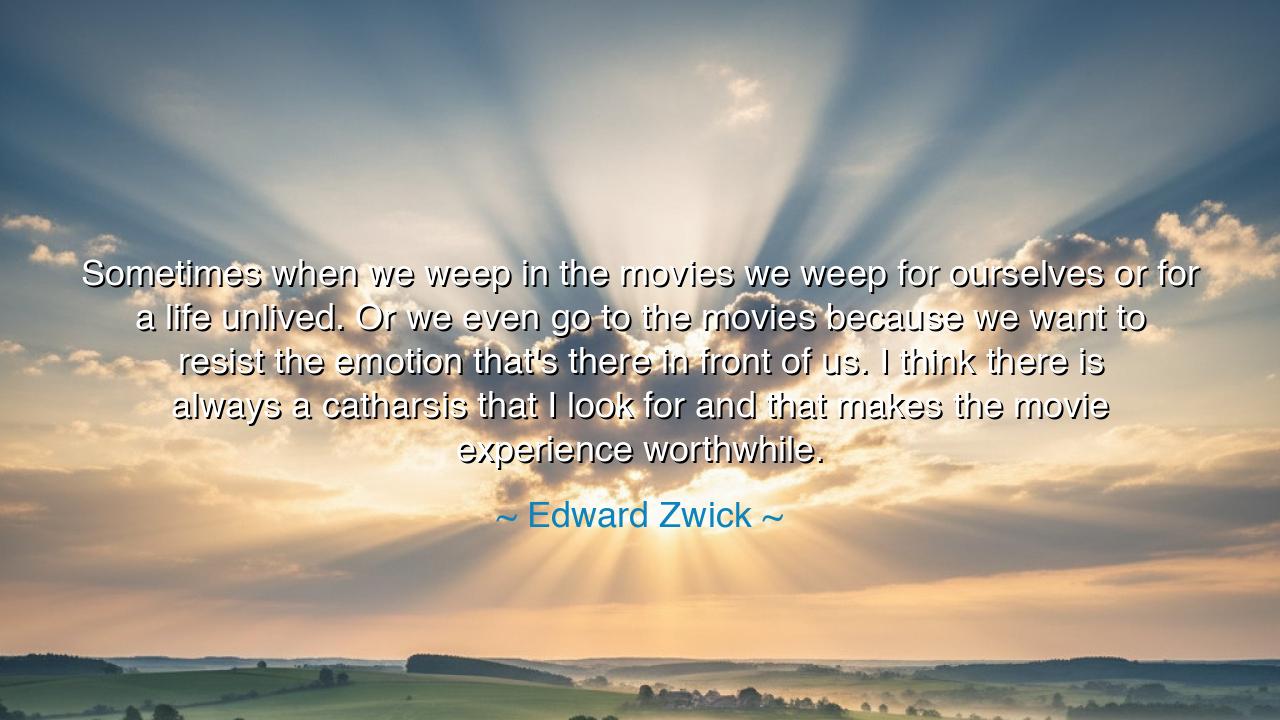
Sometimes when we weep in the movies we weep for ourselves or
Sometimes when we weep in the movies we weep for ourselves or for a life unlived. Or we even go to the movies because we want to resist the emotion that's there in front of us. I think there is always a catharsis that I look for and that makes the movie experience worthwhile.






Listen, O seekers of wisdom, to the words of Edward Zwick, a sage of the screen, who speaks of the profound journey that unfolds when we sit in the darkness of a movie theater. He said, "Sometimes when we weep in the movies we weep for ourselves or for a life unlived. Or we even go to the movies because we want to resist the emotion that's there in front of us. I think there is always a catharsis that I look for and that makes the movie experience worthwhile." These words invite us to consider the power of cinema and the emotions that it evokes, for the experience of watching a film is never just about the story unfolding before us—it is about the story within us, the untold story of our own hearts.
Movies, in their grandest form, do more than entertain—they speak to the deepest parts of our souls, parts that are often left hidden. When we weep before the screen, we do not merely weep for the characters; we weep for our own unfulfilled dreams, for the lives we wish we had lived, or for the paths we did not take. In the flickering images of the screen, we see reflections of ourselves—lost loves, missed opportunities, and faded hopes. The characters that dance before our eyes are often the avatars of our own desires, the echoes of the lives we have always yearned for but have not yet embraced. The tears that fall are not only for their pain but for our own pain, for the fears and longings that we carry deep within us.
Consider the story of Orpheus, the ancient hero whose love for Eurydice led him to the underworld. His journey is one of longing, of seeking something lost, of desiring to change the course of fate itself. When Orpheus gazed back at his beloved Eurydice, the moment was tragically fleeting. Yet his journey, fraught with yearning and loss, speaks to the very nature of human existence. We, too, are often on a journey to reclaim what is lost—whether it is a love, a dream, or a part of ourselves that we abandoned long ago. When we watch the drama of others, we often watch through the lens of our own struggles, and in doing so, we find a release—a catharsis—that heals what was broken.
But Zwick also speaks of a more complex aspect of our nature: the desire to resist the very emotions that rise in us when faced with intense storytelling. There are moments when we go to the movies not to feel, but to escape, to numb the emotions that threaten to overwhelm us in our daily lives. The cinema becomes a shield, a place where we can face sorrow, joy, and despair in a controlled environment. The screen offers us a place to resist the full force of our emotions, allowing us to feel them without truly confronting them. And yet, even in this resistance, there is a release, for it is in these very moments of emotional evasion that we find the space to begin understanding the complexity of our own hearts.
Reflect now on the timeless example of William Shakespeare, whose tragedies like Hamlet and Macbeth have long been the crucibles for emotional release. When we watch Hamlet struggle with vengeance and fate, or when we see Macbeth wrestle with his ambition, we do not merely see them as characters on a stage. We see ourselves reflected in their struggles. Shakespeare understood the human soul better than many, crafting stories that allowed us to face our own fears and desires through the lens of his characters. The catharsis he provided was not just in their resolution, but in the release of emotion they offered to the audience. The pain, the love, the loss—these emotions are not merely theirs, they are ours, and it is through the art of storytelling that we confront them.
The lesson Zwick offers is both profound and simple. In every great movie, in every great story, there lies a potential for healing and understanding—a potential for catharsis. But we must approach this catharsis with an open heart. Emotions, as we have learned, are not to be feared, nor to be avoided. They are guides—teaching us about our own fears, regrets, and dreams. A movie, then, is not just an escape; it is a path to self-discovery. It is an opportunity to look within and see what has been left unsaid, what has been left undone. We weep, not just for the characters, but for ourselves—and in that weeping, there lies the possibility for growth.
Thus, let us embrace the emotional journey that each movie invites us to undertake. Let us not shy away from the tears, the laughter, or the tension that builds within us. Instead, let us welcome these emotions as opportunities for healing and clarity, for it is through them that we come closer to understanding who we truly are. Movies are not merely stories; they are mirrors of our own lives, reflecting the emotions we often dare not face. And when we allow ourselves to experience them fully, we achieve not just catharsis, but a deeper connection to the world and to ourselves.






AAdministratorAdministrator
Welcome, honored guests. Please leave a comment, we will respond soon